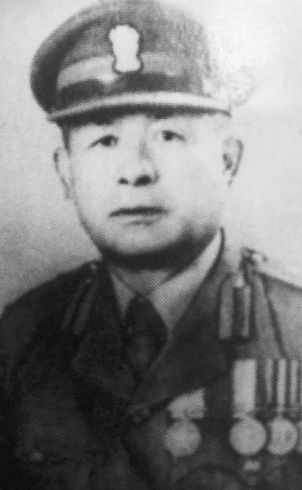Lt Col Sher Jung Thapa — Skardu’s tiger
Col Dilbag Dabas (Retd)
Sher Jung Thapa was born on June 18, 1908, at Abbotabad, in present day Pakistan. His parents, simple Gorkhas that they were, relocated to McLeodganj, near Dharamsala, in the present day Himachal Pradesh, long before the two-nation theory was even conceived by the Congress and the Muslim League.
Following the footsteps of his ancestors, Sher Jung, too, by choice, preferred to be a soldier. His loyalty to the state of Kashmir and the capability to command and lead the men did not go unnoticed. Sher Jung was commissioned into the 6th Battalion of the Jammu & Kashmir Infantry on August 16, 1932. By the time partition happened, Sher Jung, as a Lieutenant Colonel, was commanding the battalion he was commissioned into.
At the time of partition, almost half of India was ruled by the princely states, the native allies of the British. By July 25, 1947, all princely states had acceded to the new dominion of India, barring Hyderabad and Kashmir, because their rulers thought that their state was big enough to exist independently. Taking advantage of the wavering stand of Maharaja of Kashmir, Pakistan, in connivance with the British officers, who chose to stay back and serve with the Pakistan army, planned the annexation of the state of Kashmir.
The execution of Pakistan’s ambitious plan began in late August 1947 and by the time the Maharaja signed the instrument of accession to Indian dominion on October 26, 1947, the Pakistan army in the garb of tribal lashkars reached Baramula. And, Srinagar — the state capital — was not far off.
In August 1947 at the time of invasion of Jammu and Kashmir by the Pakistani lashkars, the entire northern frontier of Jammu and Kashmir state from Bunji to Leh, approximately 200 miles (excluding Gilgit Agency) was manned by the 6th Battalion of Jammu and Kashmir Infantry Regiment (6th J&K ). After the fall of Bunji in early November 1947, the Battalion, under Lieutenant Colonel Sher Jung Thapa’s command, was ordered to move to Skardu with as many troops as possible.
On February 11, 1948, Skardu was attacked and surrounded by approximately 600 strong tribal lashkar. The enemy’s attack was beaten back by the 6th J&K under the determined leadership of Lieutenant Colonel Sher Jung Thapa. Unable to capture the Skardu fort, the enemy laid siege to the fort, which continued for six months. Despite dwindling rations, ammunition, shortage of water, lack of medicines, heavy casualties and overwhelming odds, the enemy’s repeated attempts to capture the fort were thwarted every time inflicting heavy casualties on the enemy. It all happened under the dynamic and inspiring leadership of Lieutenant Colonel Sher Jung Thapa.
After going through the siege for long and when no help could be rendered from outside, Lieutenant Colonel Thapa was asked by Major General KS Thimayya, General Officer Commanding 19 Infantry Division to surrender. Lieutenant Colonel Thapa, like a typical Gorkha, stoutly opposed the offer and with total disregard to his personal safety, continued to hold on to the fort steadfastly.
On the fateful day of August 14, 1948, the gallant survivors of 6th J&K, utterly exhausted and on the verge of starvation, out-numbered 5 to 1, without ammunition, ration and any hope of succor from outside, had no alternative but to capitulate. This ended the siege of Skardu fort, which had kept a superior enemy at bay for six months and three days. For his gallant action and inspirational leadership, Lieutenant Colonel Sher Jung Thapa was awarded the Maha Vir Chakra. After formal declaration of the cease fire on the night of January 1, 1949, Lieutenant Colonel Sher Jang Thapa and his men were repatriated to India.
After the war with Pakistan ended in January, 1949, the 6th J&K was re-designated as Jammu & Kashmir Militia and merged with the 14th battalion, which fought the Chinese gallantly in Ladakh sector during the 1962 India-China war. Thereafter, it was demobilised and the troops were absorbed into the Dogra Infantry battalions.
Sher Jung Thapa, the Tiger of Skardu, the Maha Vir, whom the sons of the soil affectionately refer to simply as ‘Himachali Thapa’, superannuated on June 30, 1962, after attaining the well-deserved rank of Brigadier.
How he led from the front
On February 11, 1948, Skardu was attacked and surrounded by approximately 600 strong tribal lashkar. The enemy's attack was beaten back by the 6th J&K under the determined leadership of Lieutenant Colonel Sher Jung Thapa. Unable to capture the Skardu fort, the enemy laid siege to the fort, which continued for six months. Despite dwindling rations, ammunition, shortage of water, lack of medicines, heavy casualties and overwhelming odds, the enemy's repeated attempts to capture the fort were thwarted every time inflicting heavy casualties on the enemy. It all happened under the dynamic and inspiring leadership of Lieutenant Colonel Sher Jung Thapa. After going through the siege for long and when no help could be rendered from outside, Lieutenant Colonel Thapa was asked by Major General KS Thimayya, General Officer Commanding 19 Infantry Division to surrender. Lieutenant Colonel Thapa, like a typical Gorkha, stoutly opposed the offer and with total disregard to his personal safety, continued to hold on to the fort steadfastly. On the fateful day of August 14, 1948, the gallant survivors of 6th J&K, utterly exhausted and on the verge of starvation, out-numbered 5 to 1, without ammunition, ration and any hope of succor from outside, had no alternative but to capitulate. This ended the siege of Skardu fort, which had kept a superior enemy at bay for six months and three days. For his gallant action and inspirational leadership, Lieutenant Colonel Sher Jung Thapa was awarded the Maha Vir Chakra.
(The writer is a veteran Gunner, 6 Field Regiment)









